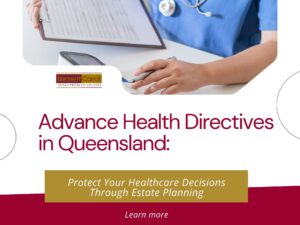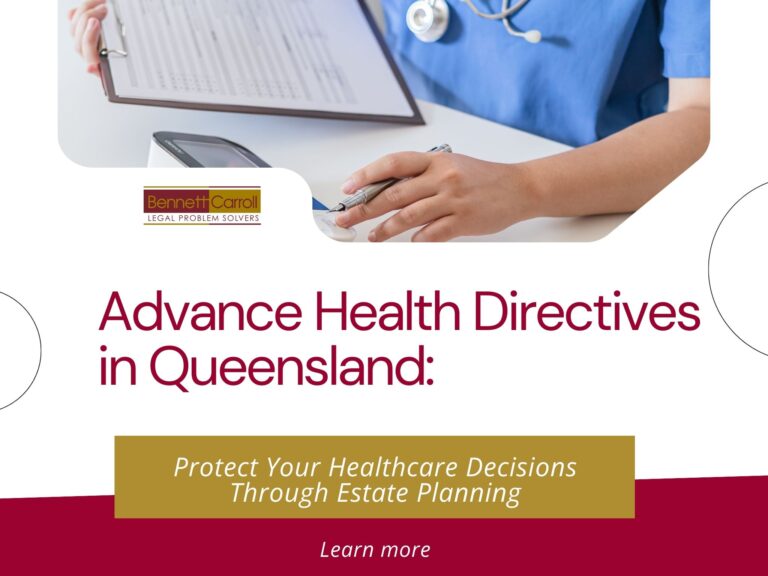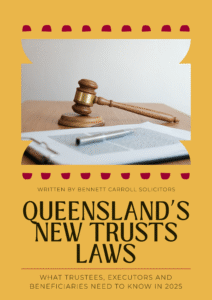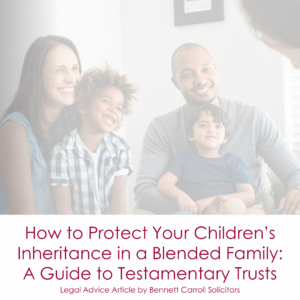Estate planning isn’t just about finances or property it’s also about protecting your healthcare choices. Many Queensland residents assume a Will or Enduring Power of Attorney (EPOA) covers medical decisions. The truth is, these documents do not. An Advance Health Directive (AHD) ensures your healthcare wishes are legally recognised if you are unable to communicate, giving clarity and peace of mind for both you and your loved ones.
Learn more: Wills & Estates in Queensland
What is an Advance Health Directive?
An Advance Health Directive is a legal document that allows you to:
- Specify medical treatments you consent to or refuse
- Appoint a health attorney to make healthcare decisions on your behalf
- Include instructions for critical scenarios, such as life-sustaining treatments or palliative care
AHDs are legally recognised in Queensland and are distinct from Wills or EPOAs, focusing solely on healthcare decisions.
See more on Queensland advance care planning forms by the Queensland Government here.
How AHDs Differ from a Will and EPOA
Wills
- Only take effect after your death
- Cannot direct medical treatment decisions
Enduring Powers of Attorney (EPOA)
- Covers financial and personal/health matters
- Does not cover specific healthcare decisions or medical treatment
Advance Health Directives (AHDs)
- Legally enforceable during your lifetime
- Appoint a trusted health attorney
- Provide clear instructions for medical professionals
Making Decisions While Hospitalised or Seriously Ill
Even if you are already unwell or admitted to hospital, you can still make or update an Advance Health Directive, provided you have the capacity to understand and communicate your decisions.
Your AHD can include:
- Do Not Resuscitate (DNR) orders
- Preferences for life-sustaining treatment or palliative care
- Guidance on interventions like ventilation, feeding tubes, or other medical procedures
Hospital staff are legally required to respect a valid AHD, ensuring your healthcare wishes are followed even during urgent or critical situations.
What Happens If Your Health Attorney Cannot Make Decisions?
If your appointed health attorney is unavailable, unwell, or lacks capacity:
- A backup attorney you have nominated can step in
- If no backup exists, Queensland law provides a hierarchy of decision-makers, including close relatives or the Public Guardian under the Guardianship and Administration Act 2000 (QLD) .
- Nominating multiple health attorneys is highly recommended to avoid delays or disputes
Why Every Queensland Resident Should Have an AHD
- Protects your right to accept or refuse medical treatment
- Reduces stress and uncertainty for loved ones
- Provides legal clarity for doctors and hospitals
- Complements your Will and EPOA for a complete estate plan
Even if you already have a Will or EPOA, an AHD ensures your healthcare preferences are clearly documented and enforceable.
Integrating an AHD with Estate Planning
For comprehensive estate planning, your AHD should be considered alongside:
- Wills – ensure healthcare and asset intentions align – Learn more about wills here
- Enduring Powers of Attorney – appoint trusted decision-makers for financial and personal matters- Learn more about EPOA’s here
- Superannuation & Binding Death Benefit Nominations (BDBNs) – protect financial intentions
Coordinating these documents provides legal clarity and peace of mind for you and your family.
Frequently Asked Questions (FAQs)
Can I update my AHD after it’s signed?
Yes. You can update or revoke your AHD at any time. It’s recommended after major life events such as illness, marriage, or divorce.
Who can be my health attorney?
A health attorney should be a trusted individual who understands your values and can make medical decisions in your best interest.
What happens if my health attorney also lacks capacity?
Backup health attorneys or statutory decision-makers, including the Public Guardian, can step in. Queensland law ensures your best interests are protected.
Is an AHD legally binding in Queensland?
Yes, as long as it meets legislative requirements, your AHD is legally enforceable.
Does an AHD replace my Will or EPOA?
No. An AHD complements these documents by covering healthcare decisions while your Will handles assets and an EPOA covers financial or personal matters.
How Bennett Carroll Solicitors Can Help
At Bennett Carroll Solicitors, we help Queensland residents:
- Draft valid Advance Health Directives
- Prepare Wills and Enduring Powers of Attorney
- Coordinate all documents for a holistic estate plan
Our services are available across Brisbane, Stafford, Upper Mount Gravatt, Kawana, Mermaid Beach, and Ipswich, or remotely via phone, email, or video.









